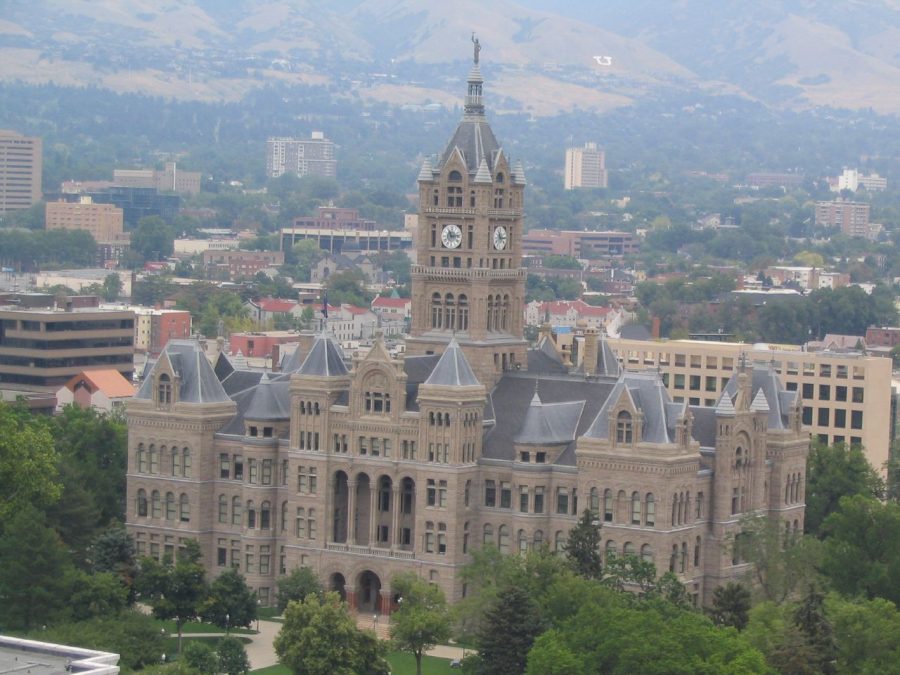Earlier this month, protestors gathered to speak up against the controversial inland port, a future development project which would transform northwest Salt Lake City into a global import and export hub. The inland port would likely increase air and rail traffic through the state and is being legally disputed through a lawsuit filed by Salt Lake City Mayor Jackie Biskupski.
There have been peaceful demonstrations against this project in the past, which have resulted in the delay of meetings for the plan’s advancement. However, a particular protest held outside of the City and County building and inside of the Salt Lake Chamber of Commerce on July 9 became extremely intense and even threatening at some points. The originally peaceful demonstration was organized by a few different groups, including Utah Against Police Brutality and ICE Free SLC.
All in all, eight protestors were arrested. Of those eight, three were cited while the remaining were taken to jail for a variety of “investigation of charges,” such as trespassing and assault. Fortunately, no serious injuries occurred from the clash between protestors and the heavy police presence.
In the aftermath of the incident, Governor Gary Herbert issued a statement about the out-of-hand protest at the Salt Lake Chamber of Commerce, claiming, “This was more than just a protest; this was borderline terrorism.”
Governor Herbert’s comments were ill-chosen and harmful to community activism. Referring to something as “borderline terrorism” is a very serious call to make, especially when it’s done by the leading executive of the State. It can have the impact of silencing an entire movement. While violence should not ever be tolerated, there is a way to call out dangerous escalation by activists and police without entirely ignoring and wiping away the significant objections against the inland port.
Citizens fighting against the eventual environmental injuries which would arise from the inland port is absolutely not borderline terrorism. Blocking traffic by marching across the street, while disruptive and upsetting for commuters, is also not terrorism. Even if a demonstration goes south, a group of protesters clashing with the police is not “borderline terrorism.”
On the other hand, destroying a fragile, unique and essential wetland habitat by replacing it with rails, concrete and shipping is also not borderline terrorism, as some activists have suggested. Even so, the objections from many in the community against that environmental harm that the port would cause should not be wholly discredited. The Governor’s statement does just that, and fails to consider the very serious dissent by families, organizers and policymakers against the port.
Connecting activism to terrorism is hardly a new tactic, and it’s important to understand that the words officials use to describe these exercises of First Amendment rights can have reaching implications. For example, protesters against the Dakota Access Pipeline — another instance of a dispute over environmental harm and injustice — were labeled as “terrorists” by politicians. 84 members of Congress sent a letter to the Department of Justice asking for the Department to look into its policies related to the Patriot Act and possibly prosecute protesters as “terrorists.” Further, legislation has sprung up in states with the goal of defining certain protests as “economic terrorism” and increasing criminal penalties for actions defined as such. This labeling trend is inappropriate and frankly un-American.
Classifying political protest as terrorism should not be so effortless for politicians. They should not be permitted to easily discredit and suppress criticism of actions being carried out by the government. A government is supposed to represent its people, meaning there will be times where it must be receptive to objections. It is a shame that these protesters and police officers became violent, because there are valid concerns about the port’s effect on environmental quality, economic growth and a constitutional struggle between a smaller governmental power against a greater one — in this case, Salt Lake City versus the state legislature. Governor Herbert should call out the violence from the protest, but there is a more responsible way to do that than the extremely exaggerated and dismissive wording he chose.



